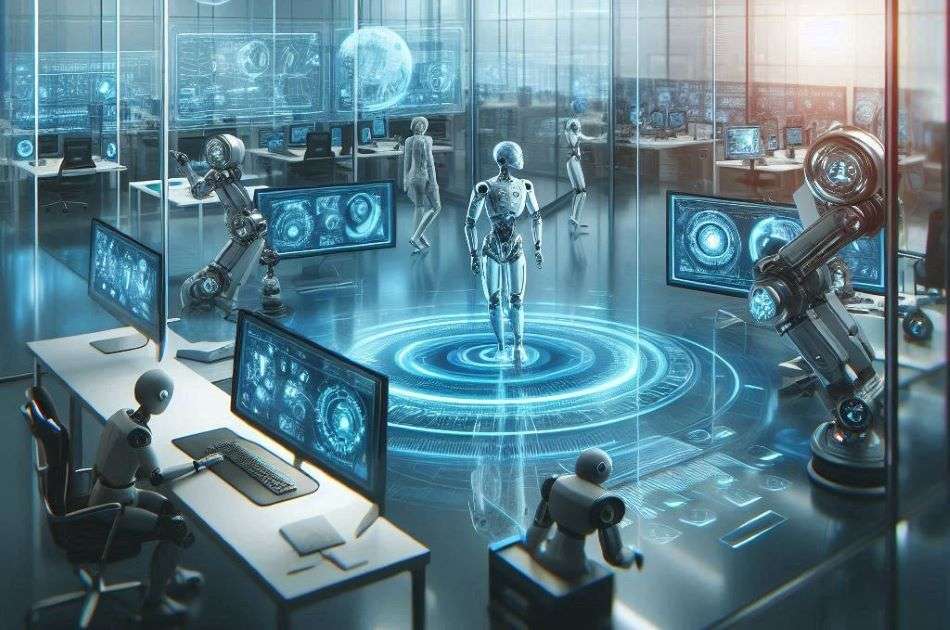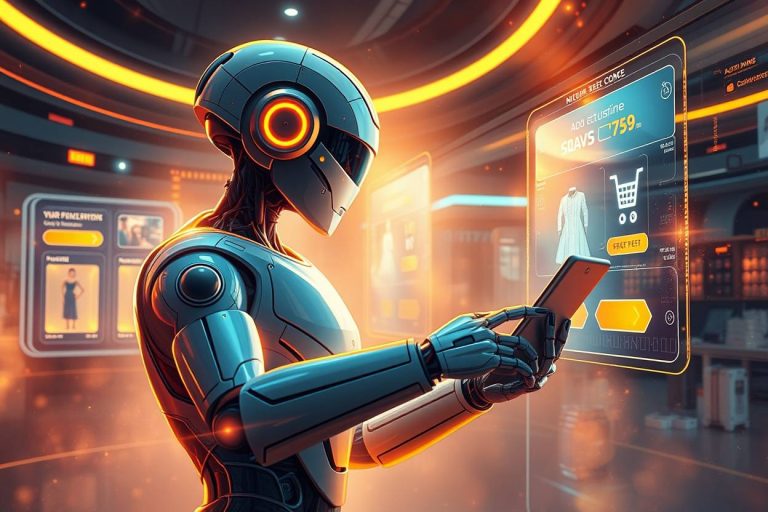Getting started with AI – capabilities, tips, and what to expect?

Whenever new tech spreads globally, it grabs the attention of critics and fans alike. World history has recorded countless examples of these attitudes, ranging from newspapers, calling the Internet a fad to journalists mocking the idea of humans stepping on the surface of the moon. Even electric streetlights were depicted as “a fearful source of death” by critics in the 1880s! We find AI or artificial intelligence being met with similar concerns today, as we just getting started with AI. Is it for good reasons?
We used to imagine a world where machines enhanced our creativity and empowered us to make better decisions. What was once seen as a distant dream in the ‘50s has now turned into an everyday reality, where AI helps us create everything from vehicles, new drugs discoveries to poetry. But we can’t ignore how the rise of AI has coincided with the industry’s excessive dependence on AI tools. Tech companies have already begun firing thousands of employees because their job roles are seen as redundant due to the limitless potential of ever-evolving AI tools and semi-autonomous agents.
So, is AI a friend or foe? It is a bearer of good news or a harbinger of unemployment? What role will it play in shaping the business world? We’ll discuss AI’s capabilities and potential in this article. You’ll learn how to get started with using AI tools and make your life easier. Keep in mind that AI can help you become irreplaceable at work if you know how to use it wisely.
AI’s untapped potential and limitless capabilities
You may have noticed how whenever you search for something on Google, the search engine gives you AI Overviews relevant to your queries. It generates short snippets powered by artificial intelligence, summarizing the search results into an easy to grasp, natural-language straight forward answer.
When you try exploring the AI depths, you often come across such examples. This particular one goes by Google’s Search Generative Experience or SGE. Instead of paid websites and top SEO-optimized pages, you get an AI-driven summary related to your keywords or questions. So, what does this new trend adopted by Google tell us about AI’s capabilities?
While the rise of SGE poses a major threat to SEO experts and marketers, it also indicates that business owners have to revamp their SEO strategies to appear 1st on SERPs.
They can resort to the following alternative SGE-friendly strategies:
- Conducting risk assessments to understand potential impacts on traffic.
- Utilizing schema markups to improve content visibility.
- Focusing on visual content to enhance user engagement.
- Building brand mentions and social proof to increase credibility.
- Optimizing content for long-tail queries to capture specific user intents.
Here are some other AI capabilities that deserve our undivided attention in 2025:
Machine Learning
Machine Learning (ML) lies at the heart of AI and how those queries are processed and resolved. Due to ML, AI can learn from data and improve over time. It’s like letting the bot think for itself and self-learn without extensive human intervention. By identifying vast amounts of data, ML can make pretty good predictions about everything.
Now, eCommerce platforms are using ML tools to show consumers personalized product recommendations instead of bombarding them with irrelevant items. ML tracks their behavior and finds out which products they’re most likely to buy.
That’s how ML enhances customer satisfaction (and sells more products!).
Natural Language Processing
Natural Language Processing or NLP is how machines can mimic human speech. They not only understand how humans communicate but can generate human-sounding words, too.
Marketers and businesses are exploiting NLP’s potential by enhancing customer interactions with chatbots and virtual assistants (VAs). These bots can provide 24/7 support to customers, so a business can keep its customers happy.
Businesses can also use NLP tools to gauge customer feedback and perform an analysis of consumer sentiments. It’ll help marketing teams realize what customers are expecting from their brand. Morever, besides natural language, AI is great at computer languages: Google is using NLP’s ground-breaking abilities to produce 25% of its code with it, showcasing the great potential of AI in programming.
Computer Vision
With computer vision, machines can even interpret visual information. You can now feed an image to AI tools and it’ll understand what’s written there or what does it actually represent. For instance, you can share a math equation or a differential formula inscribed on a picture, and AI tools will read it, solve it, and even elaborate on the process.
AI can also identify objects, track movements, and even detect anomalies in medical scans with remarkable accuracy, thus improving safety and operational efficiency in healthcare. It’s a faster and potentially more accurate way to enhance patient outcomes globally.
Reinforcement learning
Reinforcement learning (RL) is a cutting-edge Artificial Intelligence discipline where algorithms learn through trial and error. By interacting with their environment, RL models refine their strategies, maximizing rewards and improving over time. Unlike traditional programming, RL allows AI to start with minimal knowledge and adapt based on experience, making it ideal for complex, dynamic tasks.
Applications of RL span many fields:
- Gaming: AI masters games like chess and Go by exploring all possible moves, often surpassing human performance.
- Robotics: Robots learn to perform tasks like assembly or navigation, adjusting actions based on real-world feedback.
- Self-Driving Cars: RL aids in real-time decision-making, helping vehicles navigate safely and interact with traffic.
- Healthcare: RL can optimize personalized treatment plans by learning patient responses and suggesting adjustments.
- Finance: AI refines trading strategies, adapting to market changes for optimized outcomes.
The potential of reinforcement learning is vast. Its self-learning nature allows for smarter, more efficient solutions across industries, but careful design and oversight are essential. RL’s growth will likely redefine innovation in sectors from healthcare to urban planning, ushering in an era of highly adaptive AI solutions.
Artificial General Intelligence
Lastly, the theoretical Artificial General Intelligence AGI appears to be the next stage in the global AI evolution. The idea is this: Building machines capable of matching human beings intellectually and doing the tasks we are capable of doing. So, AGI will be be able to:
- Understanding context
- Ponder upon complex situations and give unbiased solutions
- Think about the consequences of its actions
- Adapt to new challenges from reinforcement learning
Even though AGI is only a theoretical concept, this technology is about pushing the boundaries of what machines can achieve one day.
7 Tips for getting started with AI in 2025
A survey from AIPRM claims that almost 75% of workers in the US are now using AI at work to perform their job roles more efficiently. So, do you want to get started with AI? Here’s what you can do with it:
Automate Routine Tasks
Automation is one of the most transformative applications of Artificial Intelligence, drastically improving efficiency in repetitive tasks. Imagine you’re an email marketer for a growing brand, responsible for continuously adding new subscribers to your CRM and keeping data synchronized across project management and spreadsheet apps.
While this might seem time-consuming initially, automation tools like Zapier can streamline the process. With AI-powered automation, you eliminate manual data entry, reduce errors, and free up time for more impactful tasks, allowing you to focus on strategy and growth instead.
Use Smart Assistants and AI Agents
Turn AI agents like ChatGPT into your personal assistant, a smart tool handling everyday tasks seamlessly. From drafting emails and creating summaries to quickly generating recipes, AI agents take care of the small stuff, so you can focus on what matters most. One user even used ChatGPT to interpret a complex rental contract, helping him understand his rights and showing why his landlord was liable for an unjust eviction fine—AI translated, explained, and empowered him to act.
But ChatGPT is just one option. AI agents now come in diverse forms, specialized in everything from customer service to financial advice, offering tailored solutions for personal and professional challenges alike.
Manage Different Projects
Juggling multiple projects at the same time and feeling overwhelmed? Asana and Trello are a few tools that can help make your life easier.
These tools automatically assign tasks based on team members’ workloads, predict project timelines based on historical data, and identify potential risks before they become issues. If you’re using AI tools, get ready to become a project manager par excellence!
Communicate & Collaborate Better
Did you know that you can use AI tools to take notes in a meeting? Many AI-powered apps automatically create transcriptions so you don’t have to worry about writing everything down when meeting with a client.
After the meeting is over, you can access these summaries, review your action items, and share these notes with the client for 100% communication efficiency.
Manage your time wisely
A person recently gained traction online for using an AI tool to apply to 5,000 jobs, and even landing 20 interviews. AI helped that individual save time and become more productive at the rather exhausting task of applying for a job.
Personalize your workflow
Notion and other AI tools will create personalized workflows by generating content based on prompts or auto-filling databases with relevant info. This way, you can easily get access to all the documents and information needed to perform your job role. AI tools will transform you into a productive and successful worker—provided that you’re using them smartly.
Use Text-to-Speech Tools
Let’s say, you’re an auditory learner or simply prefer listening over reading
In. that case, you may consider using AI tools that read text aloud in a natural-sounding voice. This can help you digest information quickly while multitasking—such as listening to reports while doing household chores.
In light of these discussions, what’s next in the AI store for you?
We can see that AI has become one of the most important inventions of the past 100 years. It is here to stay! Numerous industries are adopting AI-driven operations, such as healthcare professionals embracing AI-enabled diagnostics, financial institutions using AI-powered risk & fraud detection measures, retail and e-commerce switching to personalized recommendations, etc.
If you’re worried about AI taking over your job or making you redundant, don’t forget that AI is driven by an algorithm, a set of codes that’s, after all its glamor and charm, predictable. It relies on humans for moderation. So, artificial intelligence will actually revamp the job market by introducing new job roles. Keep in mind that 6 in 10 job roles that existed in 2018 were unheard of in 1940. So, AI will usher in a new era of employment in the world.
We may witness a significant shift in work itself. Many routine tasks will be automated by the year 2030, allowing humans to focus on more complex & creative endeavors. This evolution will need a rethinking of workforce skills, emphasizing creativity, emotional intelligence, and problem-solving—areas where humans excel over machines.




